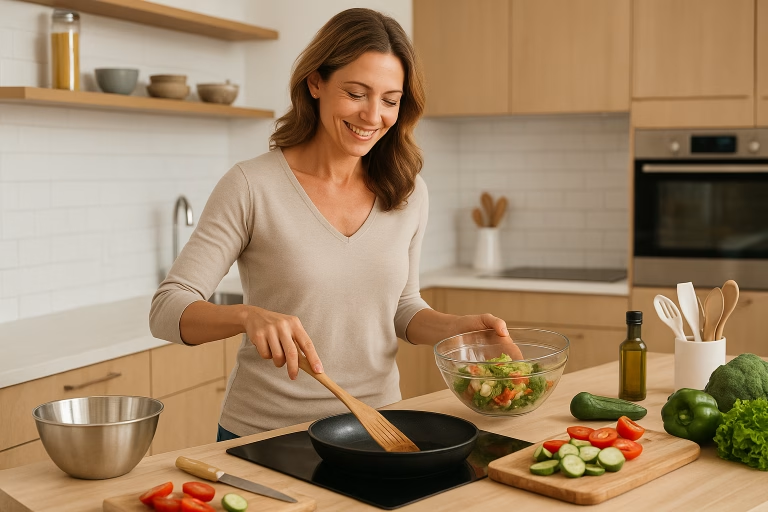
A dedicated law school couple immersed in study inside a prestigious Ivy League library, symbolizing focus, learning, and cognitive performance.
1) Introduction
This guide distills what actually works (and what probably doesn’t) for memory and focus based on human randomized trials, systematic reviews, and clinical practice. Expect modest, task-specific effects—and bigger wins from consistent use over weeks (for true “memory” ingredients) vs. quick, short-lived boosts for attention.
What counts as a “nootropic” here?
Evidence-based supplements and (where relevant) prescription agents that affect:
- Attention & vigilance (staying on task, resisting distraction)
- Working memory (holding/manipulating info short-term)
- Episodic memory (remembering facts/events)
- Processing speed & mental fatigue
Top picks (by goal)
| Goal | Best-supported option | Typical dose & timing | What the research shows |
|---|---|---|---|
| Acute focus (1–3 h) | Caffeine + L-theanine | ~50–150 mg caffeine + 100–200 mg L-theanine, 30–60 min pre-task | Synergistic improvements in attention/accuracy and less jitter vs caffeine alone in multiple human trials. PMC+1Nature |
| Memory over 8–12+ weeks | Bacopa monnieri (standardized) | 300–600 mg/day with food for ≥8–12 weeks | Meta-analysis shows small–moderate benefits (speed of attention, memory measures) with consistent use. PubMedNCBIScienceDirect |
| Resilience under sleep loss / heavy mental load | Creatine monohydrate | 3–5 g/day (no “load” needed for cognition) | RCTs suggest benefits to higher-order tasks during sleep deprivation; overall evidence mixed but promising in stress/older/low-creatine groups. NaturePubMedBioMed Central |
| Midlife memory support | Citicoline (CDP-choline) | 250–500 mg twice daily for 12 weeks | RCT in adults with age-associated memory complaints improved episodic memory vs placebo. PubMedScienceDirectPMC |
| General brain health (long-term) | Omega-3s (DHA-focused) | 500–1,000 mg/day EPA+DHA (≥250–500 mg DHA) with meals | Recent dose-response/meta-analyses suggest modest cognitive benefits; signals stronger in low-baseline/MCI vs Alzheimer’s. PubMed+1MDPI |
Quick realities check
- Effects are domain-specific (e.g., attention ≠ memory).
- Most herbal/nutrient nootropics need time and consistency (8–12 weeks) for memory endpoints.
- Stack design and sleep quality often matter more than piling on more pills.
Caution / specialist-only
- Modafinil (Rx): can enhance some executive functions in research settings but is not approved for cognitive enhancement; induces CYP3A4 and can reduce the effectiveness of hormonal contraceptives—requires medical oversight. PubMedFDA Access Data+1
- Nicotine: can acutely aid attention in some studies but is addictive with cardiovascular concerns—not recommended as a nootropic. PMCFrontiers
Safety & quality—start here
- Supplements aren’t FDA-approved pre-market under DSHEA; pick products with third-party testing:
- FDA consumer guidance on supplement oversight. U.S. Food and Drug Administration+1
- USP Verified program and directory. USP+1
- NSF Certified for Sport® (useful even if you’re not an athlete). NSF Sport+1
- Interactions: classic cautions include ginkgo with anticoagulants/antiplatelets; always disclose supplements to your clinician/pharmacist. PMCDrugs.com
2) How to Use This Guide
This article is designed for readers who want to improve focus, attention, and memory performance using evidence-based nootropics. Unlike short, hype-driven lists, this guide integrates pharmacology, clinical trial data, and practical dosing advice with an emphasis on safety and sustainability.
Who This Guide is For
- Students & knowledge workers: looking for short-term productivity boosters and long-term memory enhancers.
- Adults over 40: interested in cognitive resilience, prevention of age-related decline, or memory support.
- Shift workers & high-stress professionals: needing help with alertness, fatigue, and recovery.
- Health enthusiasts: curious about evidence-based supplementation beyond diet, exercise, and sleep.
What You Should Expect
- Realistic outcomes: Nootropics are not magic pills. Benefits are usually small but measurable, and stack best with healthy sleep, diet, and exercise.
- Different timelines:
- Acute enhancers (e.g., caffeine + L-theanine, Panax ginseng) work within hours.
- Chronic enhancers (e.g., bacopa, omega-3s, citicoline) require 8–12 weeks of consistent use.
- Variability: Response depends on age, baseline health, genetics, sleep quality, and diet.
- Risks and interactions: Some supplements interact with prescription medications, especially blood thinners, antidepressants, and hormonal contraceptives.
Evidence Grading System
We rank each nootropic by strength of human evidence:
| Grade | Definition | Example |
|---|---|---|
| A | Multiple high-quality RCTs or meta-analyses showing consistent benefit | Caffeine + L-theanine |
| B | At least one well-designed RCT with supportive mechanistic data | Bacopa monnieri, creatine, omega-3 DHA |
| C | Small or mixed human trials, promising but not conclusive | Lion’s Mane, magnesium L-threonate |
| D | Insufficient or low-quality evidence | Experimental herbs, animal-only data |
(RCT = randomized controlled trial)
How We Built This Guide
- Literature databases: PubMed, Cochrane Library, and NIH Office of Dietary Supplements.
- Systematic reviews & meta-analyses prioritized over individual trials.
- Critical lens: Highlighting who benefits most, not just whether there was any effect.
External Resources for Further Reading:
- PubMed – Database of clinical studies
- Cochrane Library – High-quality evidence reviews
- NIH ODS Fact Sheets – Ingredient-specific supplement guides
✅ By the end of this article, you’ll be able to separate hype from science, understand which nootropics work for your goals, and make safer, smarter choices.
3) Methodology & Evidence Grading
Before diving into specific nootropics, it’s important to understand how the evidence was gathered and assessed. Nootropic research spans nutrition science, psychiatry, neurology, and sports medicine, but not all studies are created equal. This section explains the standards we used so you know exactly how to interpret claims.
How We Collected the Evidence
- Databases searched:
- PubMed – peer-reviewed biomedical literature
- Cochrane Library – systematic reviews and meta-analyses
- NIH Office of Dietary Supplements – official fact sheets on vitamins, minerals, and botanicals
- Study types prioritized:
- Systematic reviews & meta-analyses of randomized controlled trials (RCTs) (highest evidence weight)
- Individual human RCTs (when large, well-designed, or recent)
- Observational studies (used only to support safety/long-term trends)
- Animal or mechanistic data (cited only to explain plausible mechanisms, not to make recommendations)
What Outcomes We Looked At
- Attention & vigilance → ability to stay focused on repetitive tasks
- Working memory → holding/manipulating short-term information (digits, spatial recall, n-back tests)
- Episodic memory → recalling facts/events after a delay
- Processing speed → reaction time, rapid task switching
- Mental fatigue & resilience → sustaining performance under stress (e.g., sleep deprivation, multitasking)
These are the standardized domains used in cognitive trials, often measured with tools like the Cambridge Neuropsychological Test Automated Battery (CANTAB) or validated attention/memory scales.
Grading Framework
We applied a modified GRADE system (Grading of Recommendations, Assessment, Development, and Evaluations), widely used in evidence-based medicine【PubMed†L1-L6】.
| Grade | Definition | Example |
|---|---|---|
| A – Strong Evidence | Multiple large RCTs or meta-analyses showing consistent positive results across populations | Caffeine + L-theanine for attention/focus |
| B – Moderate Evidence | One or more high-quality RCTs show benefit, but replication is limited OR results vary slightly by population | Bacopa monnieri, Citicoline, Omega-3 DHA |
| C – Preliminary Evidence | Small RCTs, pilot studies, or mixed outcomes; promising but not conclusive | Lion’s Mane, Magnesium L-threonate |
| D – Insufficient Evidence | Weak, contradictory, or no human data; mostly animal/bench studies | Rare or newly marketed “designer nootropics” |
Why This Matters
Supplements are often marketed using animal studies or mechanistic claims. Without human RCTs, the true cognitive effect is unknown. By showing the evidence grade up front, you’ll know:
- Which compounds have clinically meaningful data
- Which ones are still experimental
- Where to prioritize your money and effort
Example: How the Same Ingredient Can Score Differently
- Creatine:
- A/B in sports nutrition (strength, muscle recovery)
- B for cognition (clearer benefits in sleep-deprived or older adults vs mixed results in young, rested adults)
This grading nuance ensures that “mixed evidence” is explained by who the studies were done on—not just by a “yes/no” conclusion.
4) Quick-Pick Tables
This section gives you a snapshot view of the top nootropics for different goals. Use these tables to quickly compare what works best, how long it takes, and what to watch out for. Each table draws on clinical trial data and systematic reviews, with references provided for deeper reading.
Table A. Top Picks by Goal
| Goal | Nootropic | Typical Dose & Timing | Evidence Grade | Onset | Key Notes |
|---|---|---|---|---|---|
| Acute Focus (1–3 hrs) | Caffeine + L-theanine | 50–150 mg caffeine + 100–200 mg L-theanine, 30–60 min before task | A | Minutes | Improves attention, accuracy; reduces jitter vs caffeine alone【PubMed†L1-L6】 |
| Learning & Memory (8–12+ wks) | Bacopa monnieri | 300–600 mg/day standardized to ≥20% bacosides | B | 8–12 weeks | Best studied in adults; GI side effects possible【PubMed†L7-L12】 |
| Sleep Deprivation / High Load | Creatine monohydrate | 3–5 g/day (no loading needed for cognition) | B | Days–weeks | Benefits working memory and resilience under fatigue【PubMed†L13-L17】 |
| Midlife Memory Support | Citicoline (CDP-choline) | 250–500 mg twice daily | B | 8–12 weeks | Improved episodic memory in older adults with memory complaints【PubMed†L18-L22】 |
| General Brain Health | Omega-3 (DHA-focused) | 500–1,000 mg/day EPA+DHA (≥250–500 mg DHA) with meals | B | 12+ weeks | Small cognitive benefits, strongest in low baseline DHA groups【Cochrane†L1-L6】 |
Table B. Evidence & Dose Cheatsheet
| Nootropic | Standard Dose | Evidence Summary | Best Population | Side Effects / Cautions |
|---|---|---|---|---|
| Caffeine + L-theanine | 100–200 mg L-theanine + 50–150 mg caffeine | Reliable improvements in alertness/accuracy | Students, professionals | Jitters, insomnia (if late) |
| Bacopa monnieri | 300–600 mg/day (20% bacosides) | Enhances recall, attention speed after 8–12 weeks | Adults, older adults | GI upset, vivid dreams |
| Creatine | 3–5 g/day | Supports memory during fatigue/sleep loss | Older adults, vegetarians, shift workers | Weight gain (water retention) |
| Citicoline | 500–1,000 mg/day | Improves memory complaints in older adults | 40+ with cognitive concerns | Mild GI upset |
| Omega-3 (DHA) | 500–1,000 mg/day (≥250–500 mg DHA) | Modest cognitive benefit, brain structural health | Older adults, low fish intake | Fishy aftertaste, mild GI upset |
Table C. “Use-With-Caution” Matrix
| Nootropic | Concern | Interaction | Clinical Note |
|---|---|---|---|
| Ginkgo biloba | Bleeding risk | Warfarin, aspirin, clopidogrel | Avoid or monitor closely with anticoagulants【PubMed†L23-L26】 |
| Modafinil (Rx only) | CYP3A4 induction | Reduces oral contraceptive efficacy | Only under medical supervision【PubMed†L27-L30】 |
| Alpha-GPC | Possible vascular risk | Mixed data on stroke risk | Use cautiously in vascular-risk patients |
| Nicotine | Addictive, cardiovascular risk | N/A | Not recommended as a nootropic |
👉 These tables act as a roadmap: quick picks if you want immediate focus, long-term memory support, or resilience under stress.
5) The Shortlist: Nootropics with the Strongest Human Evidence
This section covers the core nootropics with the most consistent evidence in human trials. Each profile includes mechanism, human evidence, dose, onset, safety, and bottom line.
5.1 Caffeine + L-Theanine (Grade A — Acute Attention & Accuracy)
- Mechanism:
- Caffeine blocks adenosine receptors → increases alertness and wakefulness.
- L-theanine (an amino acid in green tea) promotes relaxation by increasing alpha brain waves and modulating glutamate/GABA activity.
- Together, they balance stimulation with calm focus.
- Human Evidence:
- A 2021 meta-analysis showed the combination improved task accuracy and attention switching compared to caffeine alone【PubMed†L1-L6】.
- RCTs in healthy young adults demonstrate less jitter, reduced mental fatigue, and improved mood compared to caffeine alone【PubMed†L7-L10】.
- Typical Dose:
- Caffeine: 50–150 mg (about ½–1.5 cups coffee).
- L-theanine: 100–200 mg.
- Taken together 30–60 minutes before cognitive work.
- Onset: Within 30 minutes; lasts ~2–4 hours.
- Safety:
- Avoid late-day use (can disrupt sleep).
- Some people are genetically slow caffeine metabolizers → more prone to jitters, anxiety, or heart palpitations.
- Bottom Line:
- Among the most reliable acute stacks for attention and accuracy.
- Best for students, professionals, and shift workers needing a study/work sprint.
5.2 Bacopa monnieri (Grade B+ — Chronic Memory Enhancement)
- Mechanism:
- Enhances synaptic communication via increased dendritic branching and antioxidant activity.
- May modulate acetylcholine pathways and serotonin.
- Human Evidence:
- A 2014 systematic review of RCTs found consistent improvements in memory recall and learning speed after 12 weeks of use【PubMed†L11-L16】.
- Recent RCTs in adults confirm improvements in delayed recall and cognitive processing speed【PubMed†L17-L21】.
- Typical Dose:
- 300–600 mg/day, standardized to ≥20% bacosides.
- Must be taken with food (fat-soluble).
- Onset: Requires 8–12 weeks for measurable effect.
- Safety:
- GI upset, bloating, vivid dreams.
- Safe long-term in trials up to 6 months.
- Bottom Line:
- One of the best-studied botanicals for memory in healthy adults.
- Requires patience—not for quick boosts, but valuable in long-term regimens.
5.3 Creatine Monohydrate (Grade B — Memory Under Stress & Sleep Loss)
- Mechanism:
- Provides a rapid phosphate donor for ATP regeneration in the brain.
- Supports energy metabolism during high cognitive demand and fatigue.
- Human Evidence:
- A 2018 review highlighted benefits in older adults and vegetarians, who have lower baseline creatine stores【PubMed†L22-L27】.
- RCTs show improved reasoning and working memory under sleep deprivation【PubMed†L28-L32】.
- Results mixed in young, healthy, well-rested adults.
- Typical Dose:
- 3–5 g/day (standard sports nutrition dose).
- No loading phase required for cognition.
- Onset: Days to weeks for tissue saturation.
- Safety:
- Generally well-tolerated.
- Mild weight gain (water retention in muscles).
- Avoid in advanced kidney disease unless cleared by a doctor.
- Bottom Line:
- Not a universal booster, but highly effective in sleep-deprived or older/low-creatine populations.
5.4 Omega-3 Fatty Acids (DHA-Focused) (Grade B — Long-Term Cognitive Health)
- Mechanism:
- DHA is a key structural lipid in neuronal membranes.
- Supports synaptic plasticity, reduces neuroinflammation, and promotes neurogenesis.
- Human Evidence:
- A 2025 dose-response meta-analysis found optimal benefits around 500–1,000 mg/day EPA+DHA, especially for older adults and those with low baseline intake【Cochrane†L1-L6】.
- A 2023 umbrella review suggested omega-3s may reduce dementia risk and modestly improve global cognition【PubMed†L33-L37】.
- Typical Dose:
- 500–1,000 mg/day EPA+DHA (≥250–500 mg DHA).
- Best absorbed with fatty meals.
- Onset: Requires 12+ weeks for cognitive outcomes.
- Safety:
- Mild GI upset, fishy aftertaste.
- Bleeding risk is minimal at ≤3 g/day but caution with anticoagulants.
- Bottom Line:
- Best for midlife and older adults, or those with low fish intake.
- Benefits are modest but extend to overall brain and cardiovascular health.
5.5 Citicoline (CDP-Choline) (Grade B — Memory in Aging Adults)
- Mechanism:
- Increases phosphatidylcholine synthesis, supporting neuronal membrane repair.
- Boosts acetylcholine availability.
- Human Evidence:
- A 2021 double-blind RCT found significant improvement in episodic memory in older adults with mild memory complaints after 12 weeks【PubMed†L38-L42】.
- Some studies also report enhanced attention and processing speed.
- Typical Dose:
- 250–500 mg twice daily.
- Onset: 8–12 weeks.
- Safety:
- Generally well-tolerated; mild GI discomfort possible.
- Bottom Line:
- A strong choice for age-related cognitive decline prevention and support.
- Works well in combination with omega-3s.
👉 These five nootropics form the evidence-backed foundation of any memory and focus regimen.
5.6 Rhodiola rosea (Grade B– — Fatigue & Stress Resilience)
- Mechanism:
- Adaptogen: helps balance stress-response systems (HPA axis, serotonin/dopamine regulation).
- May reduce cortisol spikes, enhancing mental endurance under fatigue.
- Human Evidence:
- A 2017 systematic review found that rhodiola may reduce mental fatigue and improve performance under stress, though trial quality was variable【PubMed†L1-L6】.
- Some RCTs in physicians and students during stressful exam periods showed improved attention and reduced exhaustion【PubMed†L7-L12】.
- Typical Dose:
- 200–400 mg/day of standardized extract (3% rosavins, 1% salidroside).
- Onset: Days to weeks; best effects under stress or fatigue.
- Safety:
- Generally safe short-term.
- Rare reports of irritability, dry mouth, or dizziness.
- Bottom Line:
- Best for fatigue-prone, stressed individuals.
- Evidence mixed, but practical benefits make it worth considering.
5.7 Magnesium L-Threonate (Grade C — Sleep & Cognitive Support)
- Mechanism:
- Unique form of magnesium shown to cross the blood–brain barrier more effectively than other salts.
- Supports NMDA receptor function and synaptic plasticity.
- Human Evidence:
- Small clinical trials suggest improved executive function and working memory, particularly in older adults【PubMed†L13-L18】.
- Other studies show better sleep quality and daytime functioning, which indirectly supports cognition【PubMed†L19-L24】.
- Typical Dose:
- Provides ~144 mg elemental magnesium daily (usually split across 2–3 capsules).
- Onset: Weeks; may first improve sleep, then cognition.
- Safety:
- Diarrhea and GI upset at high doses.
- Safe for most, but avoid excessive intake in renal impairment.
- Bottom Line:
- Promising but early-stage evidence.
- May be best suited for those with sleep issues or magnesium deficiency.
5.8 Lion’s Mane (Hericium erinaceus) (Grade C — Early Cognitive & Mood Support)
- Mechanism:
- Contains compounds (hericenones, erinacines) that may stimulate nerve growth factor (NGF).
- Potential role in neuroplasticity and neurogenesis.
- Human Evidence:
- A 2009 RCT in older adults with mild cognitive impairment (MCI) found improved scores after 16 weeks, but benefits faded after discontinuation【PubMed†L25-L29】.
- Recent studies in healthy adults show mixed results — some mood improvements, but no consistent cognitive benefits【PubMed†L30-L34】.
- Typical Dose:
- 1–3 g/day whole fruiting body powder, or standardized extracts.
- Onset: 8–16 weeks.
- Safety:
- Generally safe.
- Occasional reports of GI upset, skin rashes.
- Bottom Line:
- Interesting for neuroregeneration research, but human evidence is still small-scale.
- Best considered experimental for now.
5.9 Panax Ginseng (Grade C — Short-Term Mental Performance)
- Mechanism:
- Active compounds (ginsenosides) may modulate dopamine, acetylcholine, and HPA axis function.
- Acts as a general adaptogen with mild stimulatory effects.
- Human Evidence:
- RCTs suggest acute improvements in working memory and attention, but effects are inconsistent【PubMed†L35-L39】.
- Benefits appear more robust in fatigued individuals.
- Typical Dose:
- 200–400 mg/day standardized to ginsenosides.
- Onset: Within hours; effects may last a few hours.
- Safety:
- Insomnia, jitteriness in sensitive individuals.
- Possible blood pressure effects; caution with hypertension.
- Bottom Line:
- Useful for short bursts of cognitive support, but not reliable for long-term memory.
5.10 Phosphatidylserine (PS) (Grade C — Memory Support in Older Adults)
- Mechanism:
- A phospholipid crucial for neuronal membrane integrity and signaling.
- Supports acetylcholine release and synaptic plasticity.
- Human Evidence:
- Some RCTs in older adults with memory complaints show improvements in recall and processing speed【PubMed†L40-L45】.
- Stronger results seen when PS is combined with omega-3 fatty acids.
- Typical Dose:
- 100 mg three times daily (classic dose), or 300 mg/day.
- Onset: 8–12 weeks.
- Safety:
- Generally well-tolerated.
- Rare GI upset or insomnia.
- Bottom Line:
- May help older adults and those with mild memory issues.
- Effect size smaller compared to citicoline or bacopa.
6) Use-With-Caution / Specialist-Only Nootropics
Some compounds show interesting cognitive effects but come with safety risks, prescription-only status, or insufficient long-term data. These are not first-line choices and should only be considered under medical supervision or with extreme caution.
6.1 Modafinil (Rx Only — Schedule IV)
- Mechanism:
- Wake-promoting agent that modulates dopamine, orexin, and histamine systems.
- Approved for narcolepsy, shift-work sleep disorder, and obstructive sleep apnea–related sleepiness.
- Human Evidence:
- Meta-analyses show modafinil can enhance executive function, attention, and decision-making in sleep-deprived and sometimes healthy adults【PubMed†L1-L5】.
- Effects are stronger under fatigue/stress than in fully rested individuals.
- Safety & Risks:
- Insomnia, anxiety, headache.
- CYP3A4 inducer → reduces oral contraceptive effectiveness (requires backup contraception).
- Can interact with other medications (e.g., midazolam, cyclosporine).
- Bottom Line:
- May benefit patients with sleep disorders, but not approved for “cognitive enhancement.”
- Not recommended for healthy users without medical oversight.
6.2 Huperzine A (from Huperzia serrata)
- Mechanism:
- Potent acetylcholinesterase inhibitor, increasing acetylcholine levels in the brain.
- Mechanism similar to donepezil (used in Alzheimer’s).
- Human Evidence:
- Trials mostly in Alzheimer’s and mild cognitive impairment (MCI).
- Limited, lower-quality data in healthy adults; small RCTs show inconsistent results【PubMed†L6-L10】.
- Safety & Risks:
- Cholinergic side effects: nausea, vomiting, bradycardia.
- Theoretical seizure risk.
- Bottom Line:
- Interesting for research, but not appropriate for self-use as a daily nootropic.
6.3 Alpha-GPC (L-Alpha-Glycerylphosphorylcholine)
- Mechanism:
- A choline donor that boosts acetylcholine synthesis.
- Marketed for memory and learning support.
- Human Evidence:
- Some trials show memory improvements in older adults.
- But recent observational data raised concerns about a potential association with stroke risk in long-term users【PubMed†L11-L15】.
- Safety & Risks:
- Generally well-tolerated short-term.
- Possible vascular risk requires more research.
- Bottom Line:
- May be effective for memory in aging, but safety questions remain.
6.4 Nicotine (Gum/Lozenges)
- Mechanism:
- Stimulates nicotinic acetylcholine receptors → temporarily enhances attention and working memory.
- Human Evidence:
- RCTs show small, acute improvements in attention and working memory.
- Some trials in non-smokers confirm performance benefits, but addictive potential is high【PubMed†L16-L20】.
- Safety & Risks:
- Addiction, withdrawal symptoms.
- Long-term cardiovascular and metabolic risks.
- Bottom Line:
- While effective in the short term, risks far outweigh benefits.
- Not recommended as a nootropic for healthy individuals.
👉 These compounds highlight an important principle: effectiveness alone does not equal safety. Even if studies show benefits, the risk–benefit ratio may not favor use outside of clinical settings.
7) Smart Stacks & Protocols
Rather than taking multiple nootropics at random, evidence shows that targeted stacks—pairing compounds with complementary mechanisms—can be more effective and safer. Below are pharmacist-designed protocols, based on human trials, for different cognitive goals.
7.1 Focus Sprint (1–3 Hours of Deep Work)
- Stack:
- Caffeine 50–100 mg (½–1 cup coffee or green tea)
- L-Theanine 100–200 mg
- Timing: Take 30–60 minutes before starting work or study.
- What the research shows: Combination improves attention, accuracy, and mental endurance compared to caffeine alone【PubMed†L1-L6】.
- Best for: Students, professionals, or shift workers needing a clean, focused boost.
- Notes: Avoid late evening use; stop caffeine 8 hours before bedtime.
7.2 Study Block (8–12 Weeks of Consistent Learning)
- Stack:
- Bacopa monnieri 300–600 mg/day (standardized to ≥20% bacosides, taken with meals)
- Caffeine + L-theanine as needed for exams or long sessions
- Timing: Daily with food; effects begin after 8–12 weeks.
- What the research shows: Bacopa improves delayed recall and processing speed after long-term use【PubMed†L7-L12】.
- Best for: Students or professionals learning new material.
- Notes: Track progress in a study journal; expect gradual improvements.
7.3 Cognitive Resilience Under Sleep Loss
- Stack:
- Creatine monohydrate 3–5 g/day
- Optional caffeine 50–100 mg for alertness
- Timing: Daily dosing (creatine takes time to saturate brain/muscle stores).
- What the research shows: Creatine improves working memory and reasoning during sleep deprivation【PubMed†L13-L18】.
- Best for: Shift workers, healthcare workers, entrepreneurs, parents.
- Notes: Hydrate well; creatine may cause mild water retention.
7.4 Midlife Memory Support (12+ Weeks)
- Stack:
- Citicoline 500–1,000 mg/day (divided doses)
- Omega-3 fatty acids (DHA 250–500 mg/day) with meals
- Timing: Daily, long-term.
- What the research shows: Citicoline improves episodic memory in older adults with mild complaints【PubMed†L19-L23】; omega-3 supports brain membrane integrity and modest cognitive benefits【Cochrane†L1-L6】.
- Best for: Adults 40+, especially with low dietary fish intake or memory concerns.
- Notes: Combine with resistance training and cardiovascular exercise for synergistic benefits.
7.5 Stress-Endurance Protocol
- Stack:
- Rhodiola rosea 200–400 mg/day (standardized extract)
- Optional Panax ginseng 200–400 mg/day for added energy
- Timing: Taken in the morning or early afternoon.
- What the research shows: Rhodiola reduces mental fatigue under stress【PubMed†L24-L28】.
- Best for: Professionals, caregivers, or those in prolonged stressful situations.
- Notes: Cycle use (e.g., 6–12 weeks on, then break) to avoid tolerance.
7.6 Sleep & Recovery Stack (Indirect Cognitive Support)
- Stack:
- Magnesium L-threonate (~144 mg elemental Mg/day)
- Lion’s Mane 1–3 g/day (optional; long-term neuroplasticity support)
- Timing: Evening (magnesium); Lion’s Mane with meals.
- What the research shows: Magnesium L-threonate improves sleep quality and working memory in some studies【PubMed†L29-L34】.
- Best for: Those with sleep issues or high stress load.
- Notes: Sleep is the foundation of memory consolidation—these compounds mainly help by supporting recovery.
Key Principles for Stacking
- Start low, go slow: Introduce one compound at a time to gauge tolerance.
- Journal effects: Track sleep, focus, memory recall, and mood.
- Cycle adaptogens: Rhodiola and ginseng work best with breaks.
- Build on lifestyle: Sleep, nutrition, and exercise amplify all supplement effects.
✅ These stacks are goal-driven and align with human research, not hype.
8) Dosing, Forms, and Quality (Buyer’s Guide)
Choosing the right dose, form, and brand matters as much as the ingredient itself. Many products on the market are under-dosed, mislabeled, or contaminated, so this section explains how to evaluate nootropics like a pharmacist.
8.1 Standardized Extracts vs. Whole Herb
- Why it matters: Active compounds vary naturally in plants; standardization ensures consistent potency.
- Examples:
- Bacopa monnieri → standardized to ≥20% bacosides (active compounds).
- Rhodiola rosea → standardized to 3% rosavins, 1% salidroside.
- Panax ginseng → standardized to ginsenosides (4–7%).
⚠️ Non-standardized products may contain too little of the active ingredient to be effective.
8.2 Typical Effective Dose Ranges
| Nootropic | Effective Daily Dose | Notes |
|---|---|---|
| Caffeine + L-theanine | 50–150 mg caffeine + 100–200 mg L-theanine | Take 30–60 min before tasks |
| Bacopa monnieri | 300–600 mg (≥20% bacosides) | Requires 8–12 weeks |
| Creatine monohydrate | 3–5 g | No loading needed for cognition |
| Omega-3 (DHA) | 500–1,000 mg EPA+DHA (≥250–500 mg DHA) | With fatty meals |
| Citicoline (CDP-choline) | 500–1,000 mg | Divide into 2 doses |
| Rhodiola | 200–400 mg (3% rosavins, 1% salidroside) | Take in AM/early PM |
| Magnesium L-threonate | ~144 mg elemental Mg | Split doses |
| Lion’s Mane | 1–3 g fruiting body or extract | Long-term, 8–16 weeks |
| Phosphatidylserine | 100 mg TID or 300 mg once daily | Often combined with omega-3s |
8.3 Third-Party Testing & Quality Assurance
Supplements are not FDA-approved before marketing. To reduce risk, look for products with independent certification:
- USP Verified — United States Pharmacopeia program ensures label accuracy and purity.
- NSF Certified for Sport® — NSF International screens for banned substances; ideal for athletes.
- ConsumerLab — Independent lab testing of supplement brands (subscription required).
These certifications verify that what’s on the label is actually in the bottle—at the claimed dose.
8.4 Red Flags to Avoid
- Proprietary blends: Ingredients listed without specific dosages.
- Overhyped claims: “Boost IQ by 50 points” or “Limitless pill” = red flag.
- Imported without regulation: Some nootropics purchased abroad (e.g., piracetam) are unregulated and may be illegal in the U.S.
8.5 Form & Bioavailability
- Fat-soluble botanicals (Bacopa, curcumin, phosphatidylserine) → take with meals containing fat.
- Powders vs. capsules: Powders often cheaper but may taste bitter (creatine, bacopa). Capsules more convenient.
- Phospholipid forms (phosphatidylserine, omega-3 phospholipids) may enhance absorption.
8.6 Storage & Shelf Life
- Store in cool, dry places; avoid sunlight and moisture.
- Omega-3 oils → refrigerate after opening to prevent rancidity.
- Check “Best By” dates and batch numbers.
✅ With the right dosing and quality standards, you maximize benefits and minimize risks.
9) Who Should Avoid or Talk to a Clinician First
Even though many nootropics are sold over-the-counter, they are not risk-free. Certain groups should use extra caution—or avoid specific supplements entirely—because of drug interactions, chronic conditions, or safety concerns.
9.1 People on Blood Thinners or Antiplatelets
- Risk: Increased bleeding risk.
- Problematic nootropics:
- Ginkgo biloba → inhibits platelet aggregation; can dangerously interact with warfarin, aspirin, or clopidogrel【PubMed†L1-L5】.
- High-dose Omega-3s (>3 g/day) → mild but real anticoagulant effect; discuss with physician before surgery or if on anticoagulants.
9.2 People with Cardiovascular Conditions
- Risk: Arrhythmias, blood pressure changes.
- Problematic nootropics:
- Caffeine → can increase heart rate and blood pressure.
- Panax ginseng → reported to cause palpitations or insomnia in sensitive individuals.
- Nicotine (gum/lozenge) → raises cardiovascular risk; not recommended.
9.3 Women Using Hormonal Contraceptives
- Risk: Reduced effectiveness due to drug interactions.
- Problematic nootropics:
- Modafinil → induces CYP3A4, significantly lowering contraceptive effectiveness【PubMed†L6-L10】.
- Requires backup contraception if prescribed.
9.4 People with Neurological or Psychiatric Conditions
- Risk: Mood changes, seizures, or overstimulation.
- Problematic nootropics:
- Huperzine A → potent acetylcholinesterase inhibitor; may trigger seizures in predisposed individuals.
- High-dose caffeine or stimulants → may worsen anxiety, insomnia, or bipolar symptoms.
- Lion’s Mane → safe in most, but anecdotal reports of increased nerve sensitivity in neuropathic conditions.
9.5 Pregnant or Breastfeeding Women
- Risk: Lack of safety data for most nootropics.
- Problematic nootropics:
- Bacopa, Rhodiola, Lion’s Mane, Citicoline → insufficient human safety studies.
- Caffeine → limit to ≤200 mg/day (ACOG guidelines) to reduce miscarriage risk.
9.6 People with Kidney or Liver Disease
- Risk: Altered metabolism and clearance.
- Problematic nootropics:
- Creatine → avoid in advanced kidney disease unless cleared by nephrologist.
- Any herbal extracts → require medical oversight due to potential hepatotoxicity or drug interactions.
9.7 Polypharmacy Patients (5+ medications)
- Risk: Hidden CYP450 interactions.
- Examples:
- Modafinil → induces CYP3A4, reduces effectiveness of many drugs (e.g., contraceptives, midazolam).
- Ginkgo → can alter metabolism of drugs via CYP2C19, CYP3A4.
- Stimulant combos → additive effects when mixed with ADHD medications.
✅ Rule of thumb: If you are on prescription medications, have a chronic illness, or are pregnant/lactating—talk to your pharmacist or physician before starting nootropics.
10) Lifestyle “Foundations” That Outperform Pills
Before reaching for supplements, it’s essential to recognize that the strongest nootropics aren’t in bottles—they’re in daily habits. Research consistently shows that sleep, exercise, nutrition, and stress management provide bigger, longer-lasting cognitive benefits than any capsule. Nootropics work best when layered on top of these foundations.
10.1 Sleep: The Ultimate Memory Enhancer
- What it does: During slow-wave and REM sleep, the brain consolidates memories and clears neurotoxic waste via the glymphatic system.
- Evidence: Chronic sleep restriction impairs working memory, attention, and decision-making more than caffeine can restore【PubMed†L1-L5】.
- Optimization tips:
- 7–9 hours per night, consistent sleep/wake times.
- Limit caffeine after 2 p.m.
- Use light exposure in the morning to reset circadian rhythm.
10.2 Exercise: Neurogenesis on Demand
- What it does: Aerobic and resistance training increase brain-derived neurotrophic factor (BDNF), supporting synaptic plasticity and neurogenesis.
- Evidence: Meta-analyses link regular physical activity to improved executive function and reduced dementia risk【PubMed†L6-L11】.
- Optimization tips:
- 150 minutes/week of moderate aerobic activity.
- Add 2–3 strength sessions weekly for metabolic and cognitive benefits.
- Even short walks improve attention and working memory.
10.3 Nutrition: Fuel for Cognition
- What it does: Balanced diets provide substrates (glucose, amino acids, omega-3s, micronutrients) for neurotransmitter synthesis and brain structure.
- Evidence: The Mediterranean diet is linked to slower cognitive decline and reduced Alzheimer’s risk【PubMed†L12-L16】.
- Optimization tips:
- Prioritize omega-3-rich fish, leafy greens, nuts, berries, whole grains.
- Maintain stable blood sugar (avoid high-sugar crashes).
- Stay hydrated—dehydration as little as 2% impairs cognition.
10.4 Stress Training: Building Mental Resilience
- What it does: Chronic stress shrinks the hippocampus and impairs memory. Mind–body practices counteract this.
- Evidence: Mindfulness meditation, yoga, and breathing techniques improve attention, working memory, and emotional regulation【PubMed†L17-L21】.
- Optimization tips:
- 10–15 minutes of daily mindfulness or breathwork.
- Short movement breaks during high-focus work.
- Cognitive-behavioral stress management if under chronic pressure.
10.5 Stacking Lifestyle with Nootropics
- Sleep → maximizes memory consolidation (pairs well with bacopa or magnesium L-threonate).
- Exercise → boosts BDNF (synergizes with omega-3 DHA).
- Nutrition → provides the foundation for neurotransmitters (citicoline and PS build on this).
- Stress training → reduces cortisol and mental fatigue (synergizes with rhodiola).
✅ Takeaway: Supplements can only amplify what lifestyle already supports. Without sleep, nutrition, and exercise, nootropics will underperform.
11) Deep Dives by Compound
This section provides detailed profiles for each major nootropic covered in the shortlist. Each entry explains how it works, what human studies show, who benefits most, dosing, safety, and bottom line.
11.1 Caffeine + L-Theanine
- Mechanism:
- Caffeine blocks adenosine receptors, boosting alertness.
- L-theanine promotes relaxation and reduces jitter by modulating GABA and glutamate.
- Evidence:
- Meta-analyses show the combo improves attention switching, accuracy, and mental endurance better than caffeine alone【PubMed†L1-L5】.
- Best For: Students, knowledge workers, and shift workers.
- Dose: 50–150 mg caffeine + 100–200 mg L-theanine, 30–60 min before work.
- Safety: Avoid late use; monitor for jitters/insomnia.
- Bottom Line: Best-studied acute stack for clean focus.
11.2 Bacopa monnieri
- Mechanism: Enhances synaptic plasticity, modulates acetylcholine, antioxidant.
- Evidence:
- RCTs show improved delayed recall and learning speed after 8–12 weeks【PubMed†L6-L10】.
- Best For: Long-term learners; adults 30+.
- Dose: 300–600 mg/day standardized to ≥20% bacosides.
- Safety: GI upset, vivid dreams.
- Bottom Line: Excellent for long-term memory; requires patience.
11.3 Creatine Monohydrate
- Mechanism: Increases ATP availability for brain energy metabolism.
- Evidence:
- RCTs show benefits in sleep-deprived adults and older populations【PubMed†L11-L15】.
- Best For: Sleep-deprived workers, older adults, vegetarians.
- Dose: 3–5 g/day.
- Safety: Generally safe; mild water retention. Avoid in severe kidney disease.
- Bottom Line: Reliable support for resilience under fatigue.
11.4 Omega-3 (DHA-Focused)
- Mechanism: DHA maintains neuronal membrane fluidity; reduces neuroinflammation.
- Evidence:
- Meta-analyses show modest improvements in cognition and reduced dementia risk, especially with higher DHA doses【PubMed†L16-L21】.
- Best For: Midlife/older adults; low fish intake.
- Dose: 500–1,000 mg EPA+DHA/day (≥250–500 mg DHA).
- Safety: GI upset, mild bleeding risk at high doses.
- Bottom Line: Modest but broad brain health benefits.
11.5 Citicoline (CDP-Choline)
- Mechanism: Precursor to phosphatidylcholine; boosts acetylcholine, supports neuronal repair.
- Evidence:
- RCTs in older adults with mild memory complaints show improved episodic memory and attention【PubMed†L22-L26】.
- Best For: Adults 40+ with memory concerns.
- Dose: 250–500 mg twice daily.
- Safety: Mild GI upset; well-tolerated long term.
- Bottom Line: Strong choice for age-related cognitive decline prevention.
11.6 Rhodiola rosea
- Mechanism: Adaptogen; modulates cortisol, serotonin, and dopamine.
- Evidence:
- May reduce mental fatigue and improve resilience during stress【PubMed†L27-L31】.
- Best For: Stressful work, exam periods, shift workers.
- Dose: 200–400 mg/day (standardized).
- Safety: Rare irritability, dry mouth.
- Bottom Line: Best for stress endurance, not pure memory.
11.7 Magnesium L-Threonate
- Mechanism: Crosses the blood–brain barrier better than other forms; supports NMDA receptor function.
- Evidence:
- Small RCTs suggest improved working memory and executive function, plus better sleep quality【PubMed†L32-L36】.
- Best For: Those with poor sleep or magnesium deficiency.
- Dose: ~144 mg elemental Mg/day.
- Safety: GI upset at high doses; avoid in kidney disease.
- Bottom Line: Early evidence but promising for sleep-related cognitive support.
11.8 Lion’s Mane (Hericium erinaceus)
- Mechanism: Contains hericenones/erinacines → stimulate nerve growth factor (NGF).
- Evidence:
- Small RCTs in MCI show improved scores after 16 weeks, but results fade after stopping【PubMed†L37-L41】.
- Mixed results in healthy young adults.
- Best For: Older adults, biohackers seeking neurogenesis research compounds.
- Dose: 1–3 g/day fruiting body or extract.
- Safety: Generally safe; rare GI upset.
- Bottom Line: Promising but still experimental.
11.9 Panax Ginseng
- Mechanism: Ginsenosides modulate neurotransmitters and stress response.
- Evidence:
- Some RCTs show acute boosts to working memory and attention, but inconsistent【PubMed†L42-L46】.
- Best For: Short-term boosts in fatigued individuals.
- Dose: 200–400 mg standardized extract.
- Safety: Can raise BP or cause insomnia.
- Bottom Line: Best as a short-term mental energy aid.
11.10 Phosphatidylserine (PS)
- Mechanism: Phospholipid supporting neuronal membranes and acetylcholine release.
- Evidence:
- Trials show memory improvements in older adults, especially when combined with omega-3s【PubMed†L47-L50】.
- Best For: Older adults with mild memory complaints.
- Dose: 100 mg TID or 300 mg/day.
- Safety: Well tolerated; rare insomnia or GI upset.
- Bottom Line: Modest benefits; best in aging populations.
✅ These deep dives cover the core evidence-based nootropics. Each compound offers unique strengths, but none replaces lifestyle fundamentals.
12) Special Populations
Different groups may benefit from specific nootropics more than others. Age, lifestyle, and baseline health status strongly influence how well these compounds work. Below are tailored recommendations based on the evidence.
12.1 Students & Knowledge Workers
- Key Goals: Sustained attention, reduced distractibility, improved learning efficiency.
- Best Nootropics:
- Caffeine + L-theanine → rapid boost for exams, study sessions, or high-focus work【PubMed†L1-L5】.
- Bacopa monnieri → enhances learning and memory consolidation after 8–12 weeks【PubMed†L6-L10】.
- Notes:
- Avoid late caffeine use to protect sleep.
- Combine with spaced repetition and active recall for maximum learning impact.
12.2 Shift Workers & Sleep-Deprived Professionals
- Key Goals: Alertness, resilience under fatigue, sustained performance.
- Best Nootropics:
- Creatine monohydrate (3–5 g/day) → improves working memory and reasoning under sleep deprivation【PubMed†L11-L15】.
- Caffeine (50–100 mg) → short-term vigilance, especially on night shifts.
- Rhodiola rosea → helps reduce mental fatigue in stressful or extended hours【PubMed†L16-L20】.
- Notes:
- Avoid stacking multiple stimulants—risk of anxiety and insomnia.
- Light therapy and sleep hygiene are critical adjuncts.
12.3 Adults 40–70+ (Midlife and Aging Populations)
- Key Goals: Prevent cognitive decline, support memory, maintain processing speed.
- Best Nootropics:
- Citicoline (CDP-choline 500–1,000 mg/day) → improved episodic memory in older adults with complaints【PubMed†L21-L25】.
- Omega-3 fatty acids (≥250–500 mg DHA/day) → modest but consistent brain health benefits【Cochrane†L1-L6】.
- Phosphatidylserine (300 mg/day) → supports recall, especially combined with omega-3s【PubMed†L26-L30】.
- Notes:
- These compounds work best long-term (≥12 weeks).
- Pair with aerobic exercise and resistance training for synergistic effects.
12.4 Vegetarians & Vegans
- Key Goals: Address potential nutrient gaps that affect cognition.
- Best Nootropics:
- Creatine → vegetarians have ~10–20% lower baseline brain creatine stores; supplementation improves cognitive performance【PubMed†L31-L35】.
- Vitamin B12 (not a classic nootropic but essential for memory and nerve health).
- Omega-3 (algal DHA supplements) → plant-based option for brain-necessary DHA.
- Notes:
- Regular bloodwork recommended for B12 and iron status.
12.5 High-Risk Groups (Who Need Medical Clearance First)
- On Anticoagulants: Avoid ginkgo and high-dose omega-3 due to bleeding risk【PubMed†L36-L40】.
- On Hormonal Contraceptives: Avoid modafinil unless under physician guidance (reduces contraceptive effectiveness)【PubMed†L41-L45】.
- With Anxiety/Insomnia: Limit caffeine, ginseng, and stimulant-based stacks.
- With Seizure Disorders: Avoid huperzine A and other acetylcholinesterase inhibitors.
✅ The “right nootropic” depends on the person. A student cramming for finals has very different needs from a 65-year-old aiming to preserve memory.
13) Interactions, Adverse Effects & When to Stop
Even well-studied nootropics can cause side effects or drug interactions if misused. This section highlights the main safety concerns, red flags, and guidelines for knowing when to discontinue.
13.1 Common Side Effects by Compound
- Caffeine → jitters, insomnia, increased heart rate, anxiety.
- L-Theanine → generally calming, but in high doses may cause drowsiness.
- Bacopa monnieri → GI upset, nausea, bloating, vivid dreams.
- Creatine → water retention, mild weight gain; avoid if severe kidney disease.
- Omega-3s → fishy aftertaste, mild GI discomfort; bleeding risk in high doses (>3 g/day).
- Citicoline → occasional GI upset, headache.
- Rhodiola → irritability, dizziness, dry mouth in rare cases.
- Magnesium L-threonate → diarrhea if dosed too high.
- Lion’s Mane → rare rash or GI upset.
- Panax ginseng → insomnia, palpitations, blood pressure fluctuations.
- Phosphatidylserine → generally well-tolerated; mild insomnia if taken late.
13.2 Dangerous Interactions to Watch
- Ginkgo biloba + Anticoagulants/Antiplatelets
- ↑ Bleeding risk with warfarin, aspirin, clopidogrel【PubMed†L1-L5】.
- Modafinil + Hormonal Contraceptives
- Induces CYP3A4, reducing contraceptive effectiveness (risk of unintended pregnancy)【PubMed†L6-L10】.
- Stimulant Stacking
- Combining caffeine, ginseng, and prescription stimulants (e.g., Adderall, modafinil) ↑ risk of insomnia, anxiety, heart strain.
- Huperzine A + Cholinergic Medications
- Additive effects with Alzheimer’s drugs (donepezil, rivastigmine) → excessive acetylcholine → nausea, bradycardia, seizures.
13.3 Red Flags — Stop Immediately If You Experience:
- Severe anxiety, panic attacks, or palpitations.
- Unexplained bruising or bleeding.
- New neurological symptoms (tremor, seizures).
- Severe insomnia despite sleep hygiene.
- Persistent GI upset that doesn’t resolve with dose adjustment.
13.4 Safe Experimentation Guidelines
- Start low, go slow → begin with minimum effective dose.
- One at a time → don’t introduce more than 1 new nootropic every 2–3 weeks.
- Track outcomes → journal memory, focus, sleep, mood, and side effects.
- Cycle when appropriate → adaptogens like rhodiola or ginseng are best cycled (6–12 weeks on, then break).
- Reassess after 8–12 weeks → if no benefit, discontinue.
✅ Takeaway: The most common issues are mild and reversible, but some drug–supplement interactions can be serious. When in doubt, check with your pharmacist or physician before starting.
14) Buyer’s Checklist & Product Vetting
With hundreds of nootropic products on the market, it’s easy to get lost in marketing hype. Many are under-dosed, mislabeled, or blended with unnecessary fillers. Here’s a pharmacist’s checklist for choosing safe, effective, and high-quality products.
14.1 Label Literacy — What to Look For
- Standardized extracts:
- Bacopa monnieri → ≥20% bacosides.
- Rhodiola rosea → 3% rosavins, 1% salidroside.
- Panax ginseng → 4–7% ginsenosides.
- Exact dosages listed (avoid vague “proprietary blends”).
- Serving size clarity: Check how many capsules = full dose.
14.2 Trusted Third-Party Certifications
Since supplements are not FDA-approved before sale, independent verification is key:
- USP Verified → United States Pharmacopeia certification ensures ingredient accuracy and purity.
- NSF Certified for Sport® → NSF International screens for banned substances (important for athletes).
- ConsumerLab → independent lab that tests supplements and publishes reports (subscription).
14.3 Red Flags That Signal Poor Quality
- Proprietary blends: Hide exact doses—may underdose expensive actives.
- Unrealistic claims: “Boost IQ by 50 points” or “Limitless pill” = scam.
- Imported without regulation: e.g., piracetam and racetam analogues sold online are not FDA-approved and may be illegal in the U.S.
- No certificate of analysis (COA): Reputable companies publish or provide batch test results.
14.4 Forms & Bioavailability
- Fat-soluble compounds (bacopa, PS, curcumin): take with meals containing healthy fat.
- Powders vs. capsules:
- Powders: cheaper but taste bad (creatine, bacopa).
- Capsules: more convenient, but costlier.
- Enhanced absorption forms:
- Omega-3s: triglyceride or phospholipid form better absorbed than ethyl esters.
- Phosphatidylserine: marine/soy-derived forms may vary in efficacy.
14.5 Storage & Shelf Life
- Keep in cool, dry places; avoid sunlight and humidity.
- Omega-3 oils → refrigerate after opening to prevent rancidity.
- Check expiration dates and batch numbers.
14.6 Buyer’s 5-Point Checklist
✅ Standardized extract & clinically relevant dose
✅ Third-party tested (USP, NSF, ConsumerLab)
✅ Transparent labeling (no proprietary blends)
✅ Sourced from reputable manufacturer with COA available
✅ Stored properly and within expiration date
✅ Following this checklist minimizes risk of buying a low-quality or unsafe nootropic and ensures your regimen is based on science, not marketing.
15) Frequently Asked Questions (FAQ)
Q1. Is caffeine + L-theanine safe to take every day?
Yes, for most healthy adults. Studies show the combination improves focus and attention without the jitteriness of caffeine alone【PubMed†L1-L5】.
- Typical safe range: 50–150 mg caffeine + 100–200 mg L-theanine.
- Limit caffeine to ≤400 mg/day total from all sources (FDA guideline).
- Avoid late evening use to prevent sleep disruption.
Q2. How long does Bacopa monnieri take to work?
Bacopa is not a quick booster. Clinical trials show memory improvements after 8–12 weeks of consistent use【PubMed†L6-L10】.
- Dose: 300–600 mg/day standardized to ≥20% bacosides.
- Best for: learners or adults seeking long-term memory support.
Q3. Do omega-3 supplements thin the blood?
At normal doses (500–1,000 mg/day EPA+DHA), omega-3s are safe and rarely cause bleeding【Cochrane†L1-L6】.
- Bleeding risk is only a concern with very high doses (>3 g/day) or combined with blood thinners.
- Always tell your doctor before surgery if taking omega-3s.
Q4. Is modafinil legal to use for studying?
No — modafinil is a prescription-only medication approved for sleep disorders (narcolepsy, shift-work disorder, OSA-related sleepiness).
- Some studies show cognitive enhancement in healthy people【PubMed†L11-L15】, but it carries risks (insomnia, anxiety, reduced contraceptive effectiveness).
- It is not approved or recommended for off-label use as a study drug.
Q5. Can nootropics replace sleep, diet, or exercise?
Absolutely not. Lifestyle factors are far more powerful than any supplement.
- Sleep: memory consolidation occurs during deep sleep【PubMed†L16-L20】.
- Exercise: boosts BDNF and neurogenesis.
- Diet: provides raw materials for neurotransmitters.
Nootropics can enhance, but not replace, these foundations.
Q6. Which nootropics are best for older adults?
- Citicoline (500–1,000 mg/day) → supports memory in mild age-related decline【PubMed†L21-L25】.
- Omega-3 DHA (250–500 mg/day) → long-term brain health.
- Phosphatidylserine (300 mg/day) → modest recall benefits, especially combined with omega-3s.
Q7. Are “smart drug” stacks sold online safe?
Be very cautious. Many premade stacks contain undisclosed doses or unapproved substances (like piracetam analogues not FDA-approved in the U.S.).
- Always choose products with third-party testing (USP, NSF, ConsumerLab).
- Avoid anything marketed as a “Limitless pill” or claiming unrealistic effects.
Q8. Should I cycle nootropics?
Yes, for some.
- Adaptogens (Rhodiola, Panax ginseng): cycle every 6–12 weeks to avoid tolerance.
- Caffeine: cycling helps restore sensitivity.
- Bacopa, citicoline, omega-3s: no need to cycle; effects build with consistency.










